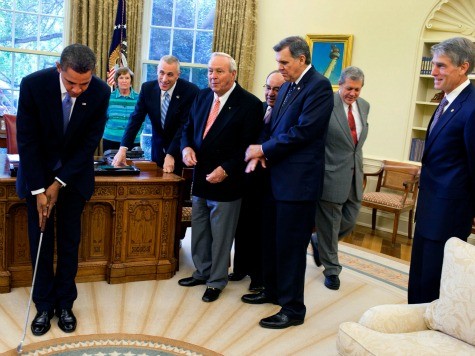For us everyday Americans, we either obey the law or face the consequences. However, that rule doesn’t apply if you’re the President of the United States and the law is the Budget Act. It’s time to change that. Current federal law mandates that the President “shall submit a budget” to Congress no later than the first Monday in February. This year, like three of the last four years, that deadline came and went without any budget from President Obama. Now the White House says that the President will wait to submit a budget until sometime in April, at the earliest.
To be fair, Congress hasn’t been any better. Over the years, the House and Senate have been notoriously lax in abiding by Budget Act timelines. Since 2010, the Senate has refused to submit any budget at all, as Majority Leader Harry Reid concluded that protecting vulnerable members of his caucus took precedence over the duties of fiscal discipline.
Fortunately, the era of congressional fiscal sloppiness may be coming to an end. In January, the House of Representatives united to pass the No Budget, No Pay Act, which states that the House and Senate each must pass a budget resolution no later than April 15, or Members of Congress won’t get their paychecks. The Senate grudgingly acquiesced to this demand, and it is now the law.
Amazingly, the threat of not getting paid seems to be working. The Senate has stopped stonewalling on the budget process, with Budget Committee Chair Patty Murray proposing a budget for the first time in three years and pledging to pass it before the April 15 deadline. The House, led by Paul Ryan, has been proactive on budget issues long before the No Budget, No Pay Act, and it’s poised to act quickly.
So where’s President Obama? The nation’s chief executive has at his disposal the Office of Management and the Budget, with a $90 million budget of its own, not to mention seasoned budget experts in every agency and department of government, yet he chose to defy the early February deadline once again.
It’s time to hold the President accountable the same way we’re now holding Congress accountable. We need an executive branch corollary to the No Budget No Pay Act that will force the President to abide by the law. If the President fails to do his job and flouts the Budget Act deadline, his pay gets docked – just like Congress.
Congressman Larry Buschon (R-IN) has proposed a bill to do just that, the aptly named SUBMIT Act. Congress should fast-track Buschon’s bill – and maybe take it even further. Many Presidents (including this one), have outside assets and income far beyond the $400,000 they earn from taxpayers each year. A pay cut may not be sufficient motivation to obey the law. So let’s also squeeze the entertainment and political travel budgets of any President who fails to do the people’s work. Taxpayers have to put up with subsidizing presidential political travel: most of the actual costs of the airplanes, motorcades, security details, advance work and other extremely expensive logistics. That comes with the job – but when the President isn’t doing the job, he or she shouldn’t get to bill the taxpayers for non-essential political activity.
The same goes for spending on lavish White House social events that aren’t open to the general public. If President Obama feels that government can’t afford White House tours under the sequester, why should taxpayers have to fund any costs associated with private concerts and dinners with movie stars when the President won’t even meet the basic statutory obligation to deliver a budget on time?
The federal budgeting process is an enormously important exercise that requires all parts of the executive branch to prioritize and make hard choices with limited resources. The President necessarily has the most information about what is happening in myriad cabinet agencies and programs, which is why the Budget Act requires the President to go first in submitting a budget to Congress before either House acts.
As a state senator, Barack Obama was famous for voting “present” on difficult issues. That’s essentially what he’s trying to do with the federal budget. But the message behind the President’s serial abdication of responsibility is that he doesn’t care enough about how our hard-earned tax dollars are spent to do the job the law requires him to do. It’s time for taxpayers to hold him accountable. And if these measures aren’t enough to force Obama to do his job, there’s always the “nuclear option”: take away his golf.

COMMENTS
Please let us know if you're having issues with commenting.